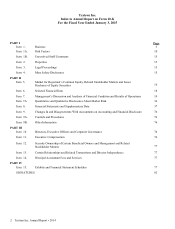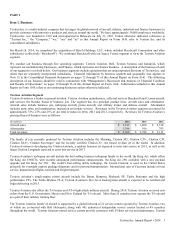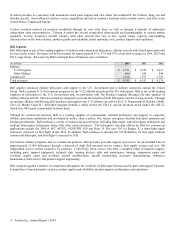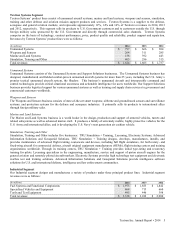E-Z-GO 2014 Annual Report Download - page 18
Download and view the complete annual report
Please find page 18 of the 2014 E-Z-GO annual report below. You can navigate through the pages in the report by either clicking on the pages listed below, or by using the keyword search tool below to find specific information within the annual report.collateral value, geographic or industry concentrations, and the effect of general economic conditions. In addition, a majority of the
new originations in our finance receivable portfolio are cross-border transactions for aircraft sold outside of the U.S. Cross-border
transactions present additional challenges and risks in realizing upon collateral in the event of borrower default, which may result
in difficulty or delay in collecting on the related finance receivables. If our Finance segment has difficulty successfully collecting
its finance receivable portfolio, our cash flow, results of operations and financial condition could be adversely affected.
We may need to obtain financing in the future; such financing may not be available to us on satisfactory terms, if at all.
We may periodically need to obtain financing in order to meet our debt obligations as they come due, to support our operations
and/or to make acquisitions. Our access to the debt capital markets and the cost of borrowings are affected by a number of factors
including market conditions and the strength of our credit ratings. If we cannot obtain adequate sources of credit on favorable
terms, or at all, our business, operating results, and financial condition could be adversely affected.
Failure to perform by our subcontractors or suppliers could adversely affect our performance.
We rely on other companies to provide raw materials, major components and subsystems for our products. Subcontractors also
perform services that we provide to our customers in certain circumstances. We depend on these suppliers and subcontractors to
meet our contractual obligations to our customers and conduct our operations. Our ability to meet our obligations to our customers
may be adversely affected if suppliers or subcontractors do not provide the agreed-upon supplies or perform the agreed-upon
services in compliance with customer requirements and in a timely and cost-effective manner. Likewise, the quality of our
products may be adversely impacted if companies to whom we delegate manufacture of major components or subsystems for our
products, or from whom we acquire such items, do not provide components or subsystems which meet required specifications and
perform to our and our customers’ expectations. Our suppliers may be less likely than us to be able to quickly recover from natural
disasters and other events beyond their control and may be subject to additional risks such as financial problems that limit their
ability to conduct their operations. The risk of these adverse effects may be greater in circumstances where we rely on only one or
two subcontractors or suppliers for a particular raw material, product or service. In particular, in the aircraft industry, most vendor
parts are certified by the regulatory agencies as part of the overall Type Certificate for the aircraft being produced by the
manufacturer. If a vendor does not or cannot supply its parts, then the manufacturer’s production line may be stopped until the
manufacturer can design, manufacture and certify a similar part itself or identify and certify another similar vendor’s part, resulting
in significant delays in the completion of aircraft. Such events may adversely affect our financial results, damage our reputation
and relationships with our customers, and result in regulatory actions and/or litigation.
Our business could be negatively impacted by information technology disruptions and security threats.
Our information technology (IT) and related systems are critical to the smooth operation of our business and essential to our ability
to perform day to day operations. From time to time, we update and/or replace IT systems used by our businesses. The
implementation of new systems can present temporary disruptions of business activities as existing processes are transitioned to
the new systems, resulting in productivity issues, including delays in production, shipments or other business operations. In
addition, we outsource certain support functions, including certain global IT infrastructure services, to third-party service
providers. Any disruption of such outsourced processes or functions also could have a material adverse impact on our operations.
In addition, as a U.S. defense contractor, we face certain security threats, including threats to our IT infrastructure, unlawful
attempts to gain access to our proprietary or classified information and threats to the physical security of our facilities and
employees, as do our customers, suppliers, subcontractors and joint venture partners. Cybersecurity threats, such as malicious
software, attempts to gain unauthorized access to our confidential, classified or otherwise proprietary information or that of our
employees or customers, as well as other security breaches, are persistent, continue to evolve and require highly skilled IT
resources. While we have experienced cybersecurity attacks, we have not suffered any material losses relating to such attacks, and
we believe our threat detection and mitigation processes and procedures are robust. Due to the evolving nature of these security
threats, the possibility of future material incidents cannot be completely mitigated. An IT system failure, issues related to
implementation of new IT systems or breach of data security, whether of our systems or the systems of our service providers or
other third parties who may have access to our data for business purposes, could disrupt our operations, cause the loss of business
information or compromise confidential information. Such an incident also could require significant management attention and
resources and increased costs, and could adversely affect our competitiveness and our results of operations.
Developing new products and technologies entails significant risks and uncertainties.
To continue to grow our revenues and segment profit, we must successfully develop new products and technologies or modify our
existing products and technologies for our current and future markets. Our future performance depends, in part, on our ability to
identify emerging technological trends and customer requirements and to develop and maintain competitive products and services.
Delays or cost overruns in the development and acceptance of new products, or certification of new aircraft and other products,
could affect our results of operations. These delays could be caused by unanticipated technological hurdles, production changes to
meet customer demands, unanticipated difficulties in obtaining required regulatory certifications of new aircraft or other products,
coordination with joint venture partners or failure on the part of our suppliers to deliver components as agreed. We also could be
adversely affected if our research and development investments are less successful than expected or if we do not adequately
12 Textron Inc. Annual Report • 2014
























